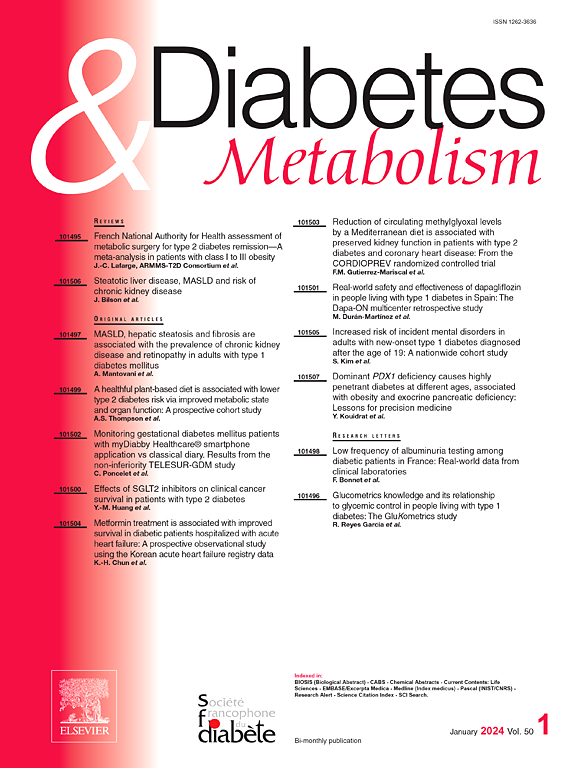急性心脏事件住院患者的糖尿病管理:法国心脏病学会和法语糖尿病学会的联合立场文件
IF 4.7
2区 医学
Q1 ENDOCRINOLOGY & METABOLISM
引用次数: 0
摘要
2型糖尿病患者,以及老年1型糖尿病患者,心血管发病率和死亡的风险很大。急性心脏事件发生后,糖尿病患者的预后受损,住院和长期发病率和死亡率明显增加。急性心脏事件后的高血糖和低血糖都是有害的,决定开始静脉注射胰岛素通常是具有挑战性的。此外,一些抗糖尿病治疗具有心脏保护作用,急性心脏事件的发作提供了转向这些治疗的机会。本立场声明的目的是为心脏病专家提供实用的工具,以改善因急性心脏事件住院的糖尿病患者的护理,并优化心脏病专家和糖尿病专家之间的合作。在总结了急性心脏事件患者抗糖尿病治疗的证据后,我们提出了一种算法,在最严重的患者中开始和适应静脉注射胰岛素,并在出院时采用标准胰岛素方案或口服治疗。我们还讨论了这些患者出院时的适当降糖治疗,基于主要的心脏科诊断,肾功能和降糖策略。最后,讨论了必须咨询糖尿病专家的情况。本文章由计算机程序翻译,如有差异,请以英文原文为准。
Management of diabetes in patients hospitalized for acute cardiac events: Joint position paper from the French Society of Cardiology and the French-speaking Diabetes Society
Patients with type 2 diabetes, but also older patients with type 1 diabetes, are at major risk of cardiovascular morbidity and death. After an acute cardiac event, the prognosis of patients with diabetes is impaired, with clear increases in in-hospital and long-term morbidity and deaths. Both hyper- and hypoglycaemia are deleterious after an acute cardiac event, and the decision to start intravenous insulin is often challenging. Moreover, some antidiabetic treatments have cardioprotective effects, and the onset of an acute cardiac event provides an opportunity to shift to these treatments. The objective of this position statement is to offer practical tools to cardiologists seeking to improve the care of patients with diabetes hospitalized for an acute cardiac event, and to optimize collaboration between cardiologists and diabetologists. After a summary of the evidence for antidiabetic treatments in patients with acute cardiac events, we propose an algorithm to start and adapt intravenous insulin in the most severe patients, and conclude with standard insulin protocols or oral treatments at discharge. We also discuss appropriate antidiabetic treatment of these patients at discharge, based on the main cardiological diagnosis, kidney function and antidiabetic strategies. Finally, situations in which the diabetologist must be consulted are discussed.
求助全文
通过发布文献求助,成功后即可免费获取论文全文。
去求助
来源期刊

Diabetes & metabolism
医学-内分泌学与代谢
CiteScore
12.00
自引率
4.20%
发文量
86
审稿时长
13 days
期刊介绍:
A high quality scientific journal with an international readership
Official publication of the SFD, Diabetes & Metabolism, publishes high-quality papers by leading teams, forming a close link between hospital and research units. Diabetes & Metabolism is published in English language and is indexed in all major databases with its impact factor constantly progressing.
Diabetes & Metabolism contains original articles, short reports and comprehensive reviews.
 求助内容:
求助内容: 应助结果提醒方式:
应助结果提醒方式:


